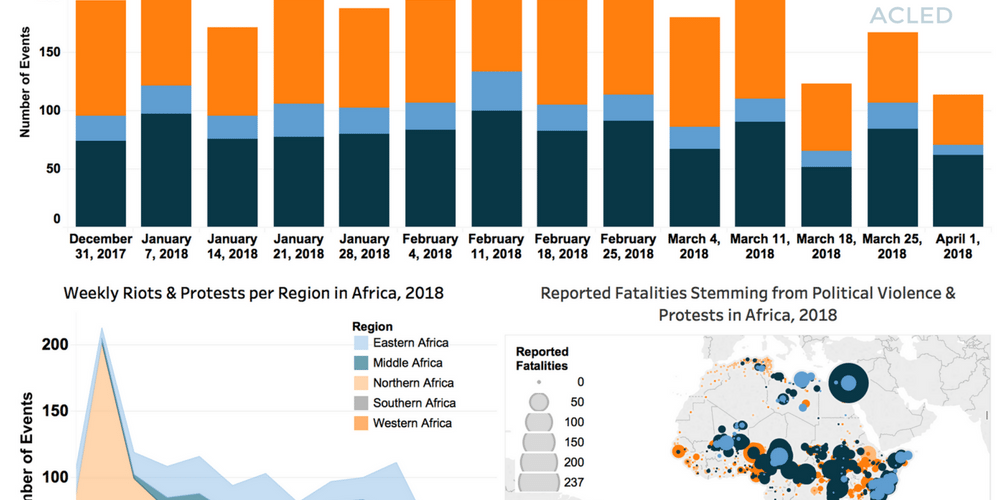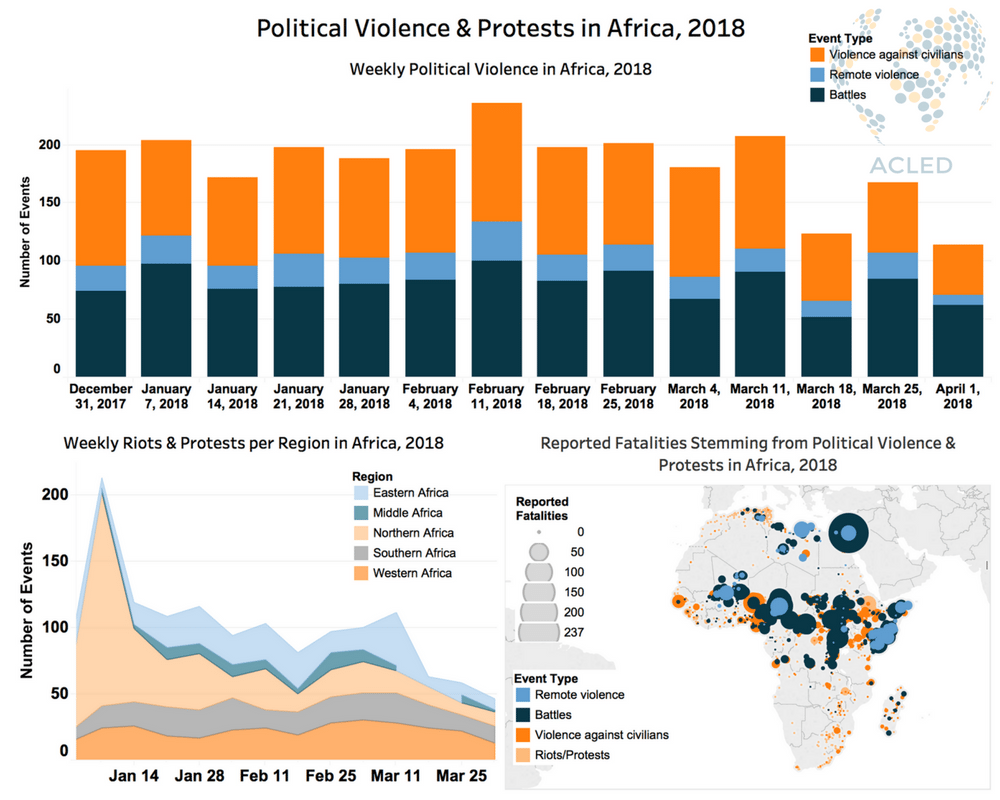The past two weeks on the Africa continent have been dominated by high-impact military operations and by worrying military and political trends in several countries.
In Mali on April 1st, an operation led by the French Barkhane troops in coordination with national forces, against Islamic State militants in Gao’s Akabar area left at least 25 killed. In the Central African Republic, on April 3rd, Anti-Balaka forces attacked MINUSCA bases in Tagbara, Bambari, leaving 44 dead. In Cameroon’s Far North region, over 30 died in the space of one week in retaliatory military operations between the state forces and Boko Haram in Hile Alifa and on the Gomoram Island. In Nigeria’s Borno state, Boko Haram also launched complex coordinated attacks on the Nigerian security forces and on civilians in the Jere area on April 1st, leaving 29 dead. Finally in Sudan, the government resumed a military campaign against remaining insurgents of the Sudan Liberation Movement/Army (Abdul Wahid al-Nur Faction) in Darfur’s East Jebel Marra, combining ground and aerial attacks against the militants with violent raids on villages in the area by its supporting militia, the Rapid Support Forces (RSF). The militants reportedly started to set up new bases in Malam and Umm Elgora in South Darfur after the state forces recovered territory in these attacks.
Elections were held across several countries in tense political climates. In Egypt on April 2nd, President al-Sisi secured a second term amid low voter turnout and heavy pressure on media outlets, civil society, political opposition members and activists. In Sierra Leone, clashes broke out between the two main political parties in various parts of the country after the presidential runoff saw the Sierra Leone People’s Party (SLPP) candidate Julius Maada Bio win against the ruling party. Curfews were declared in various northern towns as a result of the post-electoral violence. In Ethiopia, the ruling Ethiopian People’s Revolutionary Democratic Front (EPRDF) elected –for the first time in its 27-year rule– an Oromo Prime Minister, Abiy Ahmed. The move is seen as an opportunity to address the decades-long grievances among the Oromos that stoked large anti-government protests over the past few years, and to restore peace and stability in the country. Yet, the state of emergency declared last February remains in place, enabling the security forces to continue to hold a firm grip on political developments in the Oromia region: since February, regular beatings and killings have been reported in the region while more than 1,100 people have been arrested countrywide.
Political tensions were also visible in Somalia, as the motion filed by the president’s allies against the Parliamentary speaker Osman Jawari (allegedly in response to his growing political strength) led to his resignation on 9 April (and claims that the UAE were prepared to spend an enormous amount of cash to prevent the no-confidence vote but were prevented from spreading the wealth after its seizure in an airport). In Zimbabwe, carefully orchestrated primary preparations caused a number of violent incidents at party provincial headquarters, reflecting the high levels of competition in these elections and the potential for a rise in intra-party violence in the next weeks. In Tanzania, the head of the Party for Democracy and Progress (CHADEMA) was arrested alongside another five members and charged over his alleged role in a February 16 protest, during which a protester died from a stray bullet. A CHADEMA member was killed in a separate incident last February and arrests have continued since, pointing to a gradual closure of the political space in Tanzania.
Finally, several worrying movements of forces were reported over the past two weeks, notably the arrival of 50 Rwandan Interahamwe forces in Burundi’s Buganda commune, Cibitoke, allegedly to join the Imbonerakure – activity by the Interahamwe in Burundi was last reported end 2015. The deployment of Sudanese troops along border with South Sudan’s Upper Nile region also raised concerns over a renewed military escalation between the two countries, while an Islamic State base was raided in the Eastern region of Burkina Faso along the border with Niger, raising suspicions over their involvement in the recent sharp rise in attacks against forest rangers and police in the region. Finally, the setting up of bases by the Polisario front in a few areas of the UN-monitored buffer zone in Western Sahara raised concerns as they reportedly provoked Moroccan soldiers and perpetrated raids and abuses (though these allegations were rejected by the UN).







